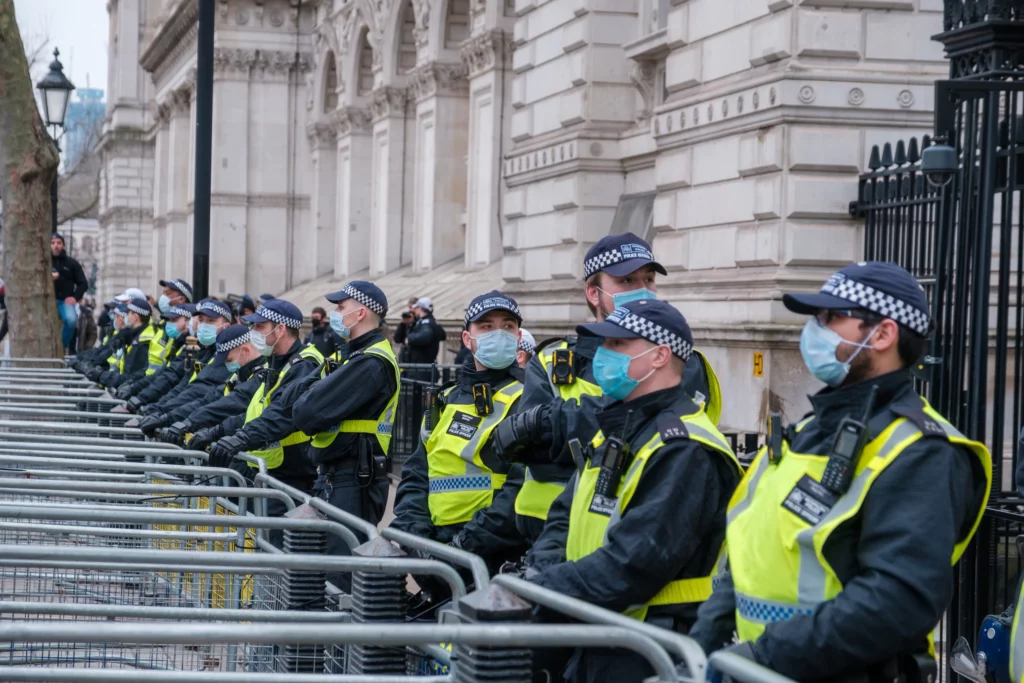In a major speech at City Hall, the Mayor of London, Sadiq Khan, will tomorrow set out the far-reaching reforms urgently needed within the Met Police to regain the trust and confidence of every community in London.
Addressing an audience including victims of crime, charities, police officers and representatives of communities across the city, the Mayor will outline how a series of appalling scandals have not only exposed ‘deep cultural problems within the Met’, but have contributed to ‘an acute crisis of confidence’ in London’s police service.
The Mayor will pay tribute to the tens of thousands of incredibly brave and decent police officers in the Met who go above and beyond every day to keep us safe and praise their contribution to violence and crime falling in London since 2016. He will make clear that we owe the men and women who risk their lives to protect our city a huge debt of gratitude.
The Mayor will explain that talking about the need for urgent police reform is not about being anti-police – far from it. He will say it’s the exact opposite as it’s about facing up to some hard truths so that we can ensure we have the best, most effective and most professional police force for Londoners.
Sadiq will also reveal that he’s spoken to many police officers who feel just as disgusted and let down as he does by what’s been exposed recently, and who are desperate to play their part in raising standards and ensuring the bond between the police and the communities they serve is restored and strengthened.
In a personal speech, the Mayor will reveal how the recent scandals have left him ‘disgusted and extremely angry’. He will say the scandals ‘cannot be explained away as the actions of just a few bad apples’ as they point to ‘a much wider problem – a damaging culture’ that reminds him of the Met from his childhood. Sadiq will say Londoners have ‘every right to be outraged and to be demanding answers’ and that his promise to communities across London is that he will ‘not stop until we’ve delivered the police reforms and step change in policing culture that our city deserves’.
Sadiq will say that policing in London is at a crossroads and that he will only support the appointment of a new Commissioner who can demonstrate they understand the true extent of the cultural problems within the Met, and the moral and operational imperatives to confront them head on. This must include publicly acknowledging the scale and depth of the problems, which will be a crucial first step for the next Commissioner to start rebuilding trust and credibility with communities.
The Mayor will promise to never shirk from supporting the police on bearing down on crime and holding the Met to account and explain why he makes no apology for making clear his demands of the next Commissioner and the urgency for far-reaching reform. He will say ‘it’s democracy in action’ and ‘the checks and balances of power, without which we’d still be living with the kind of policing we saw before the Stephen Lawrence Inquiry’.
The Mayor will outline the need for a ‘reforming Commissioner’ to help deliver the widescale cultural, systemic and organisational change at the Met, and to forge a new contract between the police and the public to restore trust so that all of London’s communities feel like the police are ‘there not to threaten or criminalise them, but to protect and serve them’.
The Mayor will demand a host of new commitments and reforms, including:
- More robust vetting of new and serving police officers.
- Better recruitment processes to ensure the Met only gets the right, top quality people in the job.
- Far-reaching changes to the misconduct process, which includes making them much faster.
- Proactive procedures to weed out those who should never have been allowed to become police officers in the first place.
- Strengthened IT monitoring within the Met to help identify corrupt officers and inappropriate behaviour.
- Ensuring officers and staff have the confidence to come forward as whistle blowers.
- Better training and supervision – particularly sergeants and inspectors who are so influential in shaping the frontline police culture and delivering the policing Londoners expect.
- Clear steps on how the Met will not just tackle racism within, but proactively be an anti-racist institution.
- Greater community oversight and engagement with Londoners from all backgrounds.
- And wider systemic and organisational reforms to ensuring the Met is the best in the world at the bread-and-butter issues of policing – from a world-class emergency response, to better crime detection – a key part of rebuilding trust.
The Mayor will acknowledge that change on this scale will be difficult, but he’ll say we ‘owe it to Stephen Lawrence, to Sarah Everard, to Child Q, to all the victims of these recent scandals, to all their friends and families, and to all Londoners –– to continue the struggle with fierce determination and an unflinching sense of purpose’.
On the recent scandals, the Mayor of London, Sadiq Khan, is expected to say:
“The reality is that a series of appalling scandals have not only exposed deep cultural problems within the Met, but have contributed to an acute crisis of confidence in London’s police service. A crisis that has left trust in the Met police at rock bottom among too many communities – many of whom, if we’re being honest, already had little faith in our police service.
“I’ll never forget the first time I read the shocking Operation Hotton report by the Independent Office for Police Conduct just over four months ago. It exposed sickening evidence of overt racism, sexism, homophobia, discrimination and misogyny among police officers at Charing Cross station. But perhaps what was most striking – and revealing – was that these officers felt comfortable sharing deeply offensive messages in Whatsapp groups containing other police officers, messages that were only made public due to an IOPC investigation.
“This pointed to a much wider problem – a damaging culture. And – damningly – the Independent Office for Police Conduct concluded as much. Clearly, these issues were not isolated or historic, and cannot simply be explained away as the actions of just a few bad apples.”
On the anger he feels, the Mayor will say:
“I know what’s been exposed in recent months has profoundly affected countless Londoners, who have every right to be outraged and to be demanding answers. These are feelings I share. The scandals have left me sick to my stomach – disgusted and extremely angry. Partly because they remind me of the bad old days of the Met. The Met I know from my childhood.
“Growing up in the 1970s and 80s on a council estate in south London, it was commonplace to hear stories from friends and family members of racist, sexist and abusive behaviour by police officers. There was a palpable sense in my community that the presence of the police on our local streets did not offer reassurance or a sense of protection, but rather fear… the fear of being unfairly criminalised or mistreated.”
On the importance of trust in the police, he will say:
“In my life – and during the course of my career – I’ve seen and felt the damage that this kind of breakdown of trust can cause. It makes it harder to tackle crime. It prevents victims and witnesses of violence from coming forward. It discourages many girls and women from reporting rape, domestic abuse and sexual harassment. And it leads to local communities – the eyes and ears of the police on the ground – becoming less likely to work with officers when, for example, they’re worried about young people getting involved in criminal gangs and violence. This affects us all, and the safety of everyone in our city.
“This is why the damage to trust and confidence in the police is not a side issue or marginal concern that can be downplayed or dismissed. Trust is everything. Trust is absolutely fundamental to preventing crime, to solving crime and to ensuring we have the best possible police service for Londoners. You simply cannot divorce the deep cultural issues that clearly exist within the Met from its wider performance as an institution. The two are inextricably linked.”
On the level of change required and the need for the new Commissioner to understand and acknowledge the scale of the problem, he will say:
“We now need to see nothing less than a new contract forged between the police and the public. This means: root and branch reforms to improve policing to ensure the Met can deliver the basics better. An overhaul of disciplinary processes. And systemic change to the Met’s culture. But before any of this, Londoners need to hear the leadership of the Met publicly acknowledge the scale and depth of the problems – something which will be a crucial first step for the next Commissioner to start rebuilding trust and credibility with our communities.
“I make no apology for demanding this. It’s not being political. It’s democracy in action. It’s the checks and balances of power, without which we’d still be living with the kind of policing we saw before the Stephen Lawrence Inquiry.
“My job as the elected Mayor of this great city is not only to support the police in bearing down on crime, but to hold the Met to account. And I’ll never shirk from these duties. That’s why I want to make crystal clear today I won’t support the appointment of a new Commissioner unless that they can demonstrate they understand the true extent of the cultural and organisational problems within the Met. That they appreciate the moral and operational imperatives to confront them head on. And that they have a convincing plan to reduce crime further, improve detection rates and bring more criminals to justice.”
On the qualities needed in the next Commissioner, he will say:
“London needs a reforming Commissioner – someone who acknowledges that they’re never going to be able to solve all the problems alone. This means the type of leadership that understands and accepts the Met needs help to improve. And is ready and confident enough to bring in outside expertise and oversight to ensure we get the systemic, organisational change – from top to bottom – that’s required.
“The next Commissioner needs to ensure that every rank and layer of the Met is working towards a shared goal and is properly held to account. In short, the next Commissioner must ‘get it’. They must be a reformer. They must be humble in accepting the limitations of the Met, and open to learning and constant improvement. And they must put forward a comprehensive plan to deal with these deep-rooted problems with urgency and conviction.
“I’ll accept nothing less. This is my promise to Londoners. I’ve dedicated a large part of my working life to trying to make policing better. And – as Mayor – I’ll not stop until we’ve delivered the police reforms and step change in policing culture that our city deserves.”
On his determination to ensure the necessary police reforms are delivered, he will say:
Of course, history tells us that none of this is going to be easy. Change on this scale at the speed we need is difficult. But we owe it to Stephen Lawrence, to Sarah Everard, to Child Q, to all the victims of the recent scandals, to all their friends and families, and to all Londoners –– to continue the struggle with fierce determination and an unflinching sense of purpose. Because change is long overdue. And delivering it will be crucial to building a better, fairer and safer London for everyone, and for all of our communities. Londoners deserve the best policing in the world – and I believe we have the potential to get there.
“In 21st century Britain. In an open, diverse city like ours. It’s essential that all of London’s communities feel like the police are there not to threaten or criminalise them, but to protect and serve them. I’ve heard time and time again – directly from the parents of girls and Black teenagers, and young people across our city – that what they want more than anything else is for their children to be safe, to feel safe, and to feel like the police is there to protect them – and is on their side. On their side. They should expect nothing less. It’s what I want when my daughters go out in London. It’s what every parent and Londoner wants. And we mustn’t relent until this is the case.”
On working with the Government and the new Commissioner to deliver the reforms, he will say:
“I’m hopeful that together – in partnership with the next Commissioner, the Home Secretary, the Government, members of our police force and London’s communities – we can deliver the reforms that are needed to create a modern police service fit for the future, that we can drive out racism, misogyny, discrimination and bullying, and that we can restore the trust and confidence of Londoners in their police force.”
On the decent police officers who want to play their part in raising standards, he will say:
“I fundamentally believe in the Met. And I’m proud to be London’s Police and Crime Commissioner. I know we have thousands of brilliant police officers who not only share our concerns, but our aspirations for better policing in London. I’ve spoken to many who are just as disgusted as I am by what’s come to light in recent times – and feel badly let down by their colleagues and the toxic culture that’s been allowed to take hold. They’re desperate to play their part in raising standards, aiding organisational change within the Met, and ensuring the bond with the communities they serve is restored and strengthened.
“People who say that when we come down hard on police officers who behave badly we are somehow reducing confidence in the police are totally wrong. It’s the opposite. And it sells our good officers short. We need to create the right culture in policing to ensure the good officers have the trust of the public, which will make it far easier for them to do their job.
“It’s all the decent police officer we have in the Met which – in a large part – continues to give me hope that we can meet the challenges ahead. Because I know that with the right leadership at the top of the Met, they are the ones who can do what’s needed to win back public trust.”




